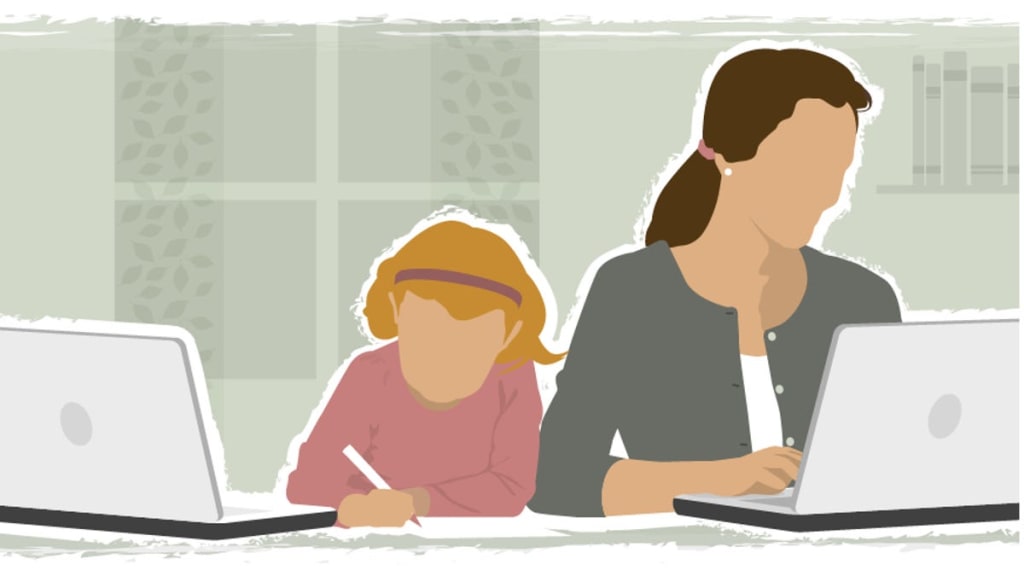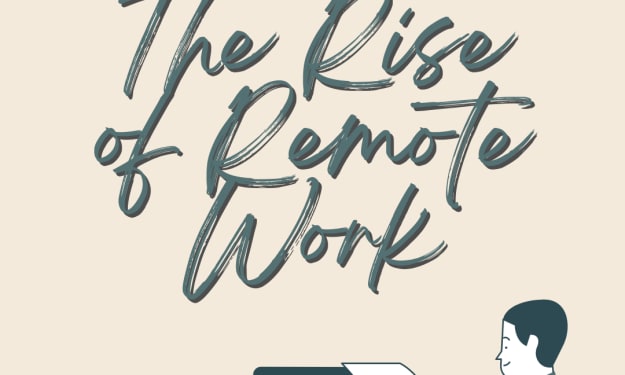Through the Eyes of the Educator
A teacher's thoughts on child-rearing

Allow me to first preface and contextualize what I want to say. Truth without love isn’t truth. It is simply bludgeoning people with facts. I am an African-American educator who has educated minds on both sides of the world. This educator loves the people in his community and comes from a place of love and understanding, an because I come from a place of love, I must tenderly tell you the truth. The last leg of my educational career has been in the lower-income sociological environment that we politely call the inner city. With that said, allow me to get to my point. As an educator, I spend more time during the weekday with people’s children than they do. As an educator, I see the effects of parents’ aptitude and relationship with their children. They say the apple doesn’t fall far from the tree, and in my experience, it takes a considerable amount of force to blow that apple from the periphery of the tree which bore it. My aim is never to judge but one can always judge a tree by its fruit. I fear to tell the truth because I know that it is fruitless and disrespectful to tell anyone how to raise their child—but I’m afraid we aren’t doing right by these kids.
As I sit at my desk at the beginning of the day watching my 7th grade students coming in, I get a glimpse of their emotional state and whatever they went through that morning. My students are a direct reflection of the familial unit, the community and the socio-cultural values around them and in no way do they come out of a vacuum, in no way can they be disassociated with the environment that produces them. Not everyone is a product of their environment but everyone is affected by it—one can not run through water and not get wet.
Many of my students come into my classroom in the mornings angry. I implore the reader to ponder why a child, of all things, comes into a classroom already angry. Angry at what? I eyeball them as they come in and for far too many of them, their attitudes are bad, their manners are bad, their spirits are in chaos and their energy is tense and disruptive. They come in disgruntled and often times hungry. Who is sending children out into the world without feeding them? Most of them struggle through the day without the necessary emotional resources at their disposal. As they come into my classroom, I notice that many are coming into the school building vexed by whatever emotional issues that are playing out in the home. If the children are waking up in peaceful, stable environments to emotionally stable parents then they tend to come in in an emotionally stable state. If they wake in peace, are actually fed and eat in peace, then they come into my classroom in a peaceful demeanor and a calm spirit ready to learn and digest the educational endeavors of the day. But if they are coming in from a hectic environment that lacks stability, they aren’t being set up for success. If I ask a student in the morning “What did you have for breakfast?” and their reply is “Cheetos and sprite” then I know we fighting an uphill battle. I can’t a fill a mind powered by an empty stomach.
I have actually had to introduce the practice of meditation to my inner-city youth as a tool to help them settle and calm their minds and emotions. It does work, but unfortunately only for a while. I have also had to implement a no-yelling policy in my classroom. Too many of my students are being yelled at by parents, which hinders the development of their communication skills. If they are only used to being yelled and screamed at, how does one suppose they will react to a boss, supervisor or spouse who communicates in a calm tone? Initially, my students are discombobulated by my calm tone of voice, its not something that they are used too. However, over time and with patient consistency on my part, the class and the classroom become quieter, calmer and more serene. By the end of the year my students are a world apart from some of the other children in the building. I dare to tell to the parents in our communities that their health is their child’s health, their happiness is the child’s happiness.
Out of eleven students in any given class, only two may exhibit behavioral problems day in and day out. For the others, it is situational and depends on the day, if at all. I do believe any educator will agree that problematic students and problematic behavior are often indicative of problems in the home. I’ve had disruptive students who act out with attention-seeking behavior, not without reason, but because they aren’t getting enough attention in the home. For the most part, children are a blank slate, they are sponges which soak up information from their environment. This process begins at birth and continues until adolescence. We must be careful, because this process happens on a subconscious level, they not only soak up your words, the tone of your words, but also your attitudes and beliefs. Children will always fail to listen to their elders, but they will never fail to imitate them. “Do as I say and not as I do” is stupid, it is hypocritical. If you discipline your children with violence, they will respond to their life problems with violence. If you don’t have a loving, nurturing and healthy relation with your spouse, how will your children even know what one looks like? If you don’t respect their boundaries, how will they learn to have boundaries with strangers? Our children are watching how we deal with our problems, how we love ourselves and how we treat ourselves and the world around us and them, and then they are imitating that behavior. When we aren’t happy our children learn that happiness isn’t important. When we abuse or ignore them, we teach them that they aren’t important. If our spouses or romantic partners abuse or disrespect us, we teach them that respect isn’t important and they are not to be respected. They are a direct reflection of us.
In many ancient societies it is said that children are a blessing. This is a common proverb spoken in agrarian societies where children are a reward for good behavior and having children is a right earned through successful initiation into the community, as well as, a source of free labor and help with the family’s business endeavors and survival. In an industrialized nation such as the United States, children are an expense. Food, shelter and healthcare must be paid for, ostensibly, by the parents. I’ve seen way too many of my students come into my classroom wearing the same outfits day after day or rotating the same three outfits—even when dirty. I due mean to posit this with a modicum of respect, my intention isn’t to be crass or “throw shade.” If we cannot afford a car note, a house payment, healthcare and basic amenities, then I think it is safe to say that we are struggling to care for and sustain our basic adult needs. If we are struggling to meet our own needs, wouldn’t it be safe to suppose that we would struggling in sufficiently, again sufficiently, meeting the needs of another human being for whom it is impossible to take care of themselves? I believe it is also important to note that the basic physical needs are simply the first rung on the ladder of needs. Beyond taking care of basic survival there is an array of emotional needs which have to do with the creation of healthy self-esteem and self-love. Too many of my students are barely getting the first rung, so one can imagine how much attention the second and third are getting.
The effects of poverty on the development of the brain are documented. The mind is a terrible thing to waste, yet if it lacks the capacity to be developed to its greatest extent then body in which it is encapsulated will have severe obstacles which appear to be without but are truly within. It is proven that growing up in extreme poverty is, in a sense, a type of trauma, a form of stress that hinders the development of the frontal lobe, the part of the brain which has to do with cause and effect. Thus, decision-making and planning are affected and hindered tremendously. Without cause and effect, students have trouble with planning a path to future success and connecting their actions with the reactions of teachers and other students. When reprimanding students for misbehavior, my students often don’t understand that my reprimand is a direct response to something that they did or said, instead they see it as within a space-time vacuum.
There is some wisdom to the saying “It takes a village to raise a child,” a child needs the support of healthy, happy parents, the support of the community that surrounds them and a foundation that sets them up for success. I am afraid that one generation is failing the next, which produces a generation that grows to adulthood without the skills and tools necessary to empower the generation that comes behind them. Instead, we have traumatized people growing up with fatalistic attitudes toward life and childbirth, giving birth to children whom they traumatize. Rinse, wash, repeat.
We can do better. Many of our youth view getting pregnant with a fatalistic attitude, as if it were simply an accidental phenomenon. Thus, young people are bringing children into this world when they aren’t ready and aren’t fully capable to taking care of themselves. Even our older parents are bringing children into this world without getting the needed healing from there childhood traumas, acting out behaviors that they themselves had to endure. Honesty is paramount, if your childhood wasn’t pleasant then please get your healing and seek out counseling less you pass on the same unpleasant childhood to your children. Remember, our healing is the child’s healing. Our pain and trauma become our children’s pain and suffering. The onus is on us, no one can do it for us and if we aren’t aware of this dynamic then our ignorance creates a holy hell for a child that didn’t ask to be here. Its time for us adopt higher ways of thinking and healthier ways of being when it comes to how we rear and raise our children. Its time for us to grow up because many of our problems are homegrown.
About the Creator
Robert Burton
A world traveler and student of life, people and the human mind. I've been molded by my origins in The American South, six years of life in The People's Republic of China and my passion for life. I live, I learn and then I write about it.






Comments
There are no comments for this story
Be the first to respond and start the conversation.